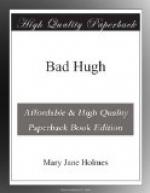“At first Eliza appeared a little cool, but this soon wore off. She did not talk much of Hugh. Neither did she say much of Adaline, who was then away at school. Still my visit was a sadly satisfactory one, as we recalled old times when we were girls together, weeping over our great loss when our husbands were laid to rest. Then we spoke of their friendship, and lastly of the contract.
“‘It sounds preposterous, in me, I know,’ Mrs. Worthington said, when we parted, ’you are so rich, and I so poor, but if ever your Alice should want a mother’s care, I will gladly give it to her.’
“This was nearly eight years ago. In my anxiety about you, I failed to write her for a long, long time, while she was long in answering, and then the correspondence ceased till just before her removal to Kentucky, when she apprised me of the change. You have now the history of Mrs. Worthington, the only person who comes to mind as one to whose care I can intrust you.”
“But, mother, I may not be wanted there,” and Alice’s lip quivered painfully.
“You will not go empty-handed, nor be a burden to them. They are poor, and money will not come amiss. I said that Mr. Liston would attend to all pecuniary matters, paying your allowance quarterly; and I am sure you will not object when I tell you that I think it right to leave Adaline the sum of one thousand dollars. It will not materially lessen your inheritance, and it will do her a world of good. Mr. Liston will arrange it for you. You will remain here until you hear from Mrs. Worthington, and then abide by her arrangements. Will you go, my daughter—go cheerfully and do as I desire?”
“Yes, mother, I’ll go,” came gaspingly from Alice’s lips. “I’ll go; but, mother, oh, mother,” and Alice’s cry ended as it always did, “you will not, you must not die!”




